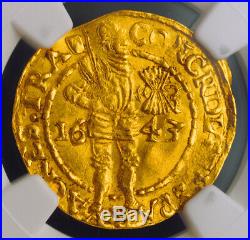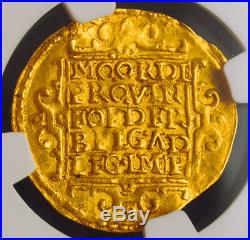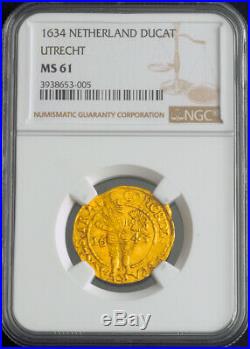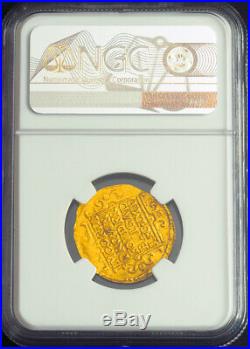




Beautiful Gold Knight Ducat Coin. Mint Year: 1643 State: United Provinces Denomination: Gold Knight Ducat Reference: Friedberg 284, KM-7.1. Certified and graded by NGC as MS-61! Mint Place: Utrecht (privy mark: shield) Material: Pure Gold! Diameter: 23mm Weight: 3.5gm. Obverse: Knight standing right in armor, holding sword which rests on shoulder and a bundle of arrows, splitting date (16-43). (shield) Expanded: “CONCORDIA RES PARvae CREScunt TRAjectum” Translated. Through unity little things grow (union is strength), Utrecht. Reverse: Legend in five lines inside ornate square. Fields around decorated with floral ornaments. ORDI PROVIN FOEDER BELG AD LEG. IMP Expanded: “MOneta ORDinum PROVINciarum FOEDERatorum BELGicarum AD LEGem IMPerii” Translated. Coin of government of the provincial federation of Belgium Conforming with the law of the Imperial. Minted in Holland beginning in the 17th century to fuel its extraordinary tenure as the world’s foremost commercial trader, the Netherlands one ducat gold coin offers both strong visual appeal and a scarcity value that could command a healthy premium in the years to come. The first Netherlands trade ducat was issued in 1487 under Phillip the Fair and a coin very similar to the one depicted above has been minted more or less continuously from the early 1600s on. The net fine weight of 3.5 grams gold never changed to the modern era. The trade ducat is minted as a gold bullion coin even today. Only the Venetian ducat has enjoyed greater longevity. The obverse of the famed ducat coin depicts a knight holding a bundle of arrows signifying the unity of the six northern provinces under the 1579 Union of Utrecht — a declaration of independence from Spain. The motto Concordia Res Parvae Crescunt translates to the union makes small things grow. The Republic of the Seven United Netherlands (or “of the Seven United Provinces”). Republiek der Zeven Verenigde Nederlanden/Provinciën. Also Dutch Republic or United Provinces in short. In Latin was a European republic between 1581 and 1795, in about the same location as the modern Kingdom of the Netherlands, which is the successor state. Before 1581, the area of the Low Countries consisted of a number of duchies, counties, and independent bishoprics, some but not all of them part of the Holy Roman Empire. Today that area is divided between the Netherlands, Belgium, Luxembourg and parts of France and Germany. The Low Countries in the 16th century roughly corresponded to the Seventeen Provinces covered by the Pragmatic Sanction of 1549 of Holy Roman Emperor Charles V. Through marriage, war or sale, these states were acquired by the Habsburg emperor Charles V and his son, king Philip II of Spain. This was the start of the Eighty Years’ War. In 1579, a number of the northern provinces of the Netherlands signed the Union of Utrecht, in which they promised to support each other in their defence against the Spanish army. This was followed in 1581 by the Act of Abjuration, the declaration of independence in which the provinces officially deposed Philip II. Later, after the assassination of William of Orange. , both Henry III of France and Elizabeth I of England declined the offer of sovereignty. However, the latter agreed to turn the United Provinces into a protectorate of England (Treaty of Nonsuch, 1585), and sent the Earl of Leicester as governor-general. This was not a success, and in 1588 the provinces became a Republic. The item “1643, Netherlands, Utrecht. Beautiful Gold Knight Ducat Coin. NGC MS-61″ is in sale since Wednesday, August 7, 2019. This item is in the category “Coins & Paper Money\Coins\ World\Europe\Netherlands”. The seller is “coinworldtv” and is located in Europe. This item can be shipped worldwide.
- Composition: Gold!
- Certification Number: 3938653-005
- Certification: NGC
- Grade: MS62
- Year: 1643

